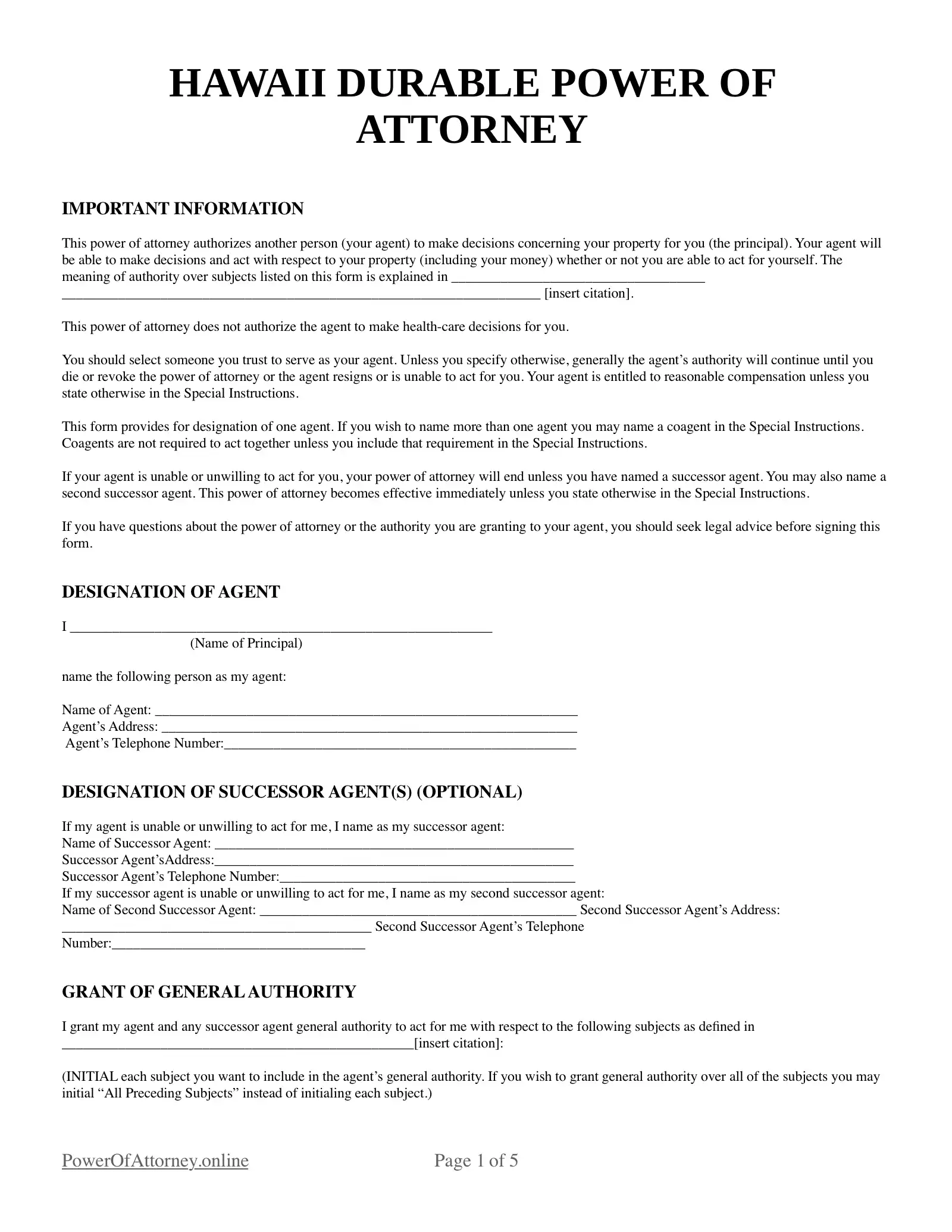Free Hawaii Durable Power of Attorney Forms
A power of attorney (POA) is a legal document that allows a person, known as the agent, to make decisions on behalf of another who is referred to as the principal. A durable POA is unique in the sense that the authority granted remains valid even if the principal becomes incapacitated. Unless it is revoked while the principal is mentally competent, it remains valid until the principal’s death.

Hawaii Durable Power of Attorney Laws
- Hawaii Revised Statutes §551E-1: Definitions - This law defines essential terminologies in the execution of POAs in Hawaii. Durable is defined as “not terminated by the principal's incapacity, with respect to a power of attorney” (HRS § 551E-1).
- Hawaii Revised Statutes §551E-3: Power of Attorney - This section discusses the signing requirements for durable POAs in Hawaii. It also explains the meaning of a durable POA: “A power of attorney created under this chapter shall be durable unless it expressly provides that it is terminated by the incapacity of the principal” (HRS § 551E-3).
Signing Requirements in Hawaii
A POA acts as an agent’s authority to decide over financial, legal, and other business matters on behalf of the principal. The principal must sign the POA in front of a notary public. The law states: “(It) shall be signed by the principal or in the principal's conscious presence by another individual directed by the principal to sign the principal's name on the power of attorney. A signature on a power of attorney is presumed to be genuine if the principal acknowledges the signature before a notary public or other individual authorized by law to take acknowledgments” (HRS §551E-3).
How To Write a Durable POA in Hawaii
If you’re worried about fulfilling your business, financial, personal, and other legal obligations should you become mentally incompetent, a Hawaii durable POA can be used to delegate these responsibilities to an agent. Here’s how to have one enforced:
1. Select an agent
Signing a durable POA means you are giving someone else permission to decide on important matters. Appoint someone you trust to protect your interests.
In many cases, the principal appoints a spouse, child, or sibling. But principals can also appoint someone they aren’t related to, such as a business partner or lawyer.
2. Agent must accept the responsibility
Once you have someone in mind, it’s time to sit down with your potential agent and see if they’re willing to accept the responsibility. Discuss your expectations, preferences, compensation, and the limitations of the document.
For example, the durable POA grants them the authority to transact on a wide variety of matters, with the exception of healthcare-related concerns. You will also have specific instructions on how your personal, legal, financial, business and other affairs should be conducted. These should be noted down on the durable POA and explained to your agent.
You should also bring up the matter of compensation. Not all agents accept compensation, particularly if it’s a family member. However, it’s good to offer remuneration for their time and reimburse them for any expenses they might shoulder while performing their duties.
3. Download Hawaii Durable Power of Attorney
You can get a durable printable POA template online, or you can also request one from a law firm in Hawaii. Both will give you access to a document keeping with Hawaii’s standard format and terminologies. If you download a template, customize the form with your and your agent’s names and addresses. Include your instructions, preferences, and other relevant details.
4. Sign the document
Make your durable POA valid and binding by signing and dating it in front of a notary public. If you are unable to sign it yourself, you can ask someone else to do it for you as long as you can show that they have your consent.
5. Use the Hawaii Durable Power of Attorney
Unless specified otherwise, the agent can start performing their duties on the date the POA was signed. Give your agent a copy of the notarized POA. They need to have a copy as it will be presented every time they make decisions or sign documents on your behalf.